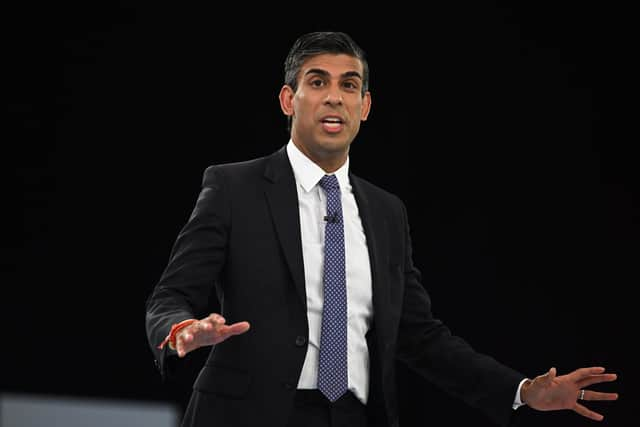Mayors set for new enhanced powers in Manchester and West Midlands
The “trailblazer” devolution deals, negotiated between the West Midlands and Greater Manchester combined authorities and the the Government will be blueprints for other regions such as South Yorkshire.
The size of the settlements are set to be agreed by the Treasury, along with powers over “fiscal devolution”, with Jeremy Hunt’s department looking at a number of proposals which could see a greater share of tax retained locally, as well as new “local taxes”.
Advertisement
Hide AdAdvertisement
Hide AdIt is understood that the Treasury is looking at permanent full retention of business rates, which mayors Andy Street and Andy Burnham currently run pilots of, as well as greater flexibility which could see rates adjusted in different sectors in order to stimulate growth.


However, officials are more sceptical of the effectiveness of local taxes, such as new taxes over tourism.
It is also understood that proposals such as devolving 1p from the base rate of income tax to be kept in local areas are not likely to be pursued, given a need to maximise returns for the Treasury, who are unwilling to open up long-established and complex forms of national taxation.
In addition, further devolved powers over skills and training, are among those most likely to be included in the final deals, with combined authorities pushing for powers over technical education and retraining in addition to their current adult skills budgets.
Advertisement
Hide AdAdvertisement
Hide AdIt comes after Mr Gove hinted at more overs over “further and technical education, transport, trade, culture and employment support” in addition to housing funds at his speech to the Convention of the North last month.
The flexible single settlement, which allows mayors to allocate funding as they see fit, is part of a move away from the “bidding war” process which sees councils and local authorities bid for shares of pots of funding from the Government, dubbed a “begging bowl” culture by Andy Street.
Multiple sources told the Yorkshire Post this week that although both Michael Gove and Jeremy Hunt are viewed as “allies” to the process of fiscal devolution, with the concept name-checked in the Chancellor’s speech last month, there are doubts over whether Treasury figures or Rishi Sunak are on board with the project.
Earlier this week, Mr Gove’s department was reined in by the Treasury when DHLUC was banned from making capital spending announcements without its approval.
Advertisement
Hide AdAdvertisement
Hide AdThe Yorkshire Post was told that Government officials are planning to implement further measures to hold mayors to account for their new powers, in order to stop Labour’s Andy Burnham taking credit for positive developments and blaming the Conservatives for any mishandling of funds.
This will be overseen by the new Office for Local Government, which is to be headed up by Lord Morse, the ex-National Audit Office (NAO) chief, which will be able to use data to measure the effectiveness of what mayors do with their new powers from Westminster.
It’s understood that a “Devolution Accountability Framework” will be published by the Government soon to provide further details.
It comes after Michael Gove, the Levelling Up Secretary, turned down a role in the newly-created Department for Science, Innovation and Technology, reportedly seen by Rishi Sunak as a more “senior” role than his current job at DHLUC.
Advertisement
Hide AdAdvertisement
Hide AdThe Yorkshire Post has been told that Mr Gove sees his work in the department, including devolution deals, as part of his political legacy which is unlikely to be unpicked by an incoming Labour government if the opposition were to win the next election.
Henri Murison, Chief Executive of the Northern Powerhouse Partnership, said: “This plan to take devolution to the next level is a serious, ambitious vision for reshaping the British state, making Jeremy Hunt the first Chancellor since George Osborne to truly understand the potential of empowered local leadership.
“Fiscal devolution isn’t about necessarily raising or lowering the overall tax burden on people - but moving where funds are retained away from central to local government.”
“Instead of central government departments operating in silos, enhanced fiscal firepower would allow Mayors to address the interconnected root causes of problems such as poor health or education outcomes through co-ordinated interventions.
Advertisement
Hide AdAdvertisement
Hide Ad“This would be a game-changer for productivity. Following the budget, we’ll be laying out our own blueprint for exactly how the next stages of fiscal devolution should work building on the direction the Chancellor is committed to.”
Adam Hawksbee, Deputy Director of the Onward think tank, said: "Britain's economic growth is held back by Whitehall hoarding power.
“The trailblazer devo deals with Andy Street and Andy Burnham are a major opportunity to do things differently.
“The Government needs to be bold - announcing at the budget steps to radically simplify funding and give mayors powers to raise, lower, and retain taxes in their areas."